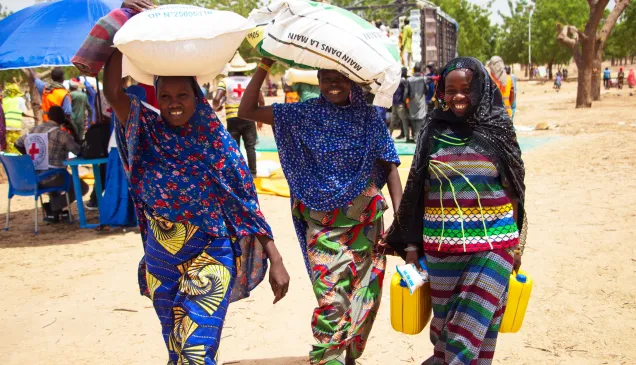Afghanistan: Cash grants helping people survive and pull through crisis
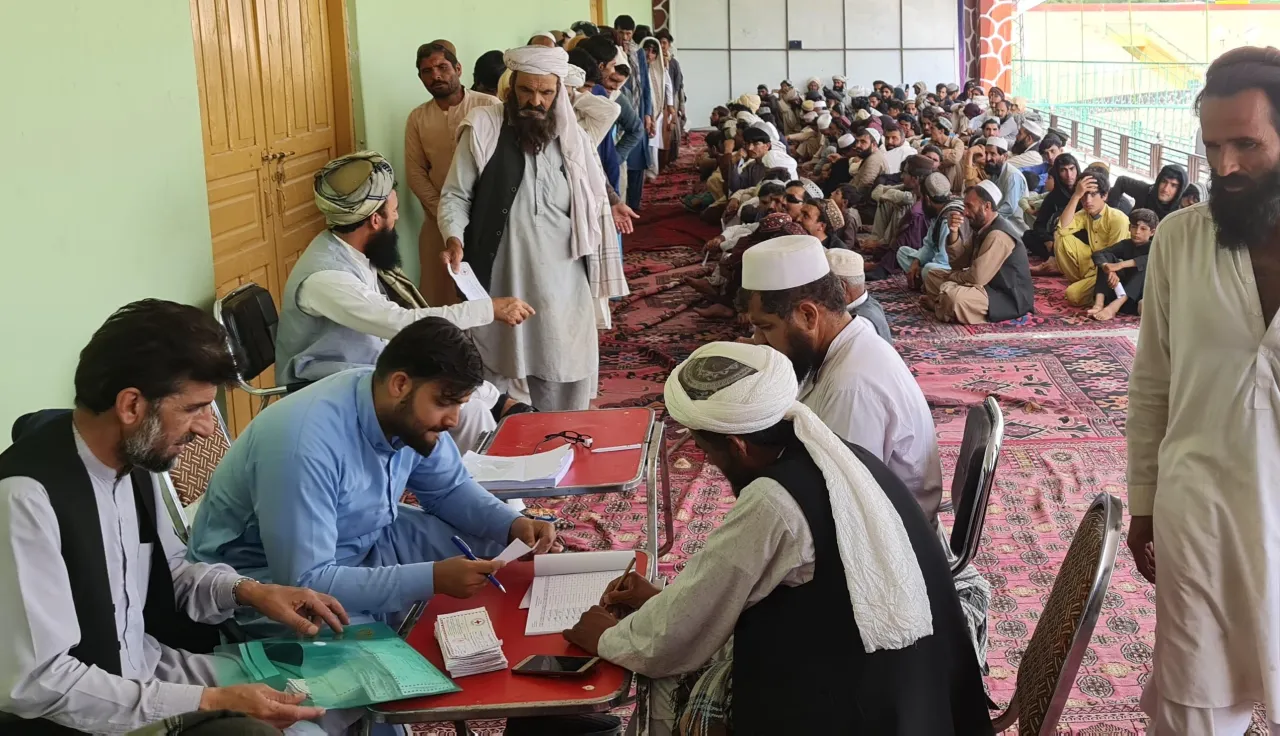
The people of Woch Khwara in eastern Khost Province of Afghanistan, comprising of those displaced from different provinces of the country and returnees from neighbouring countries, are in dire straits. Living in makeshift houses, they have minimal access to essential public services such as water, electricity or health care. This is compounded by the financial crisis and severe lack of job opportunities affecting the country. For the people of Woch Khwara, which means “dried stream” in Pashto, the situation has resulted in extreme poverty.
To help the community meet their basic needs such as food, clothing, shelter, medicines and utilities, the International Committee of the Red Cross (ICRC) gave unconditional cash grants of 20,000 Afghanis (AFN) each, approximately 230 US dollars, to 2,357 families between June and September 2022. The cash grant has helped cover the needs of over 18,000 people (about 80 per cent of the population in the area) for a period of five months. Widows, people with disabilities and low-income families with malnourished children and lactating or pregnant women make up a significant segment of this community.
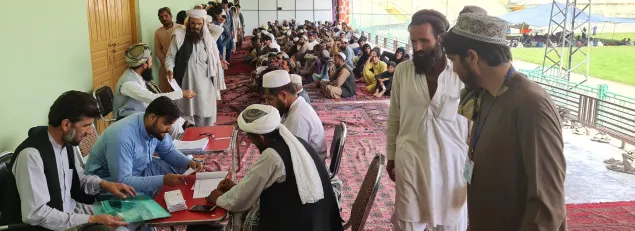
People from Woch Khwara gather at a stadium in eastern Khost Province, Afghanistan, to receive multipurpose cash grant.
Talking about the increasingly challenging economic condition, ICRC staff Talib Jan said families spent most of the cash they received to buy food and pay off shopkeepers from whom they had previously bought things on credit.
"I used the money to buy basic groceries like wheat flour, sugar and tea leaves, to pay the doctor's fees and buy medicines and also to buy shoes for my children," said a woman, requesting anonymity. A widow and mother of 16 children, she is the breadwinner for her family and has been facing the odds every day to help her family survive. "There are many problems in our area, such as lack of access to drinking water. We walk a long distance every day to fetch water," she said.
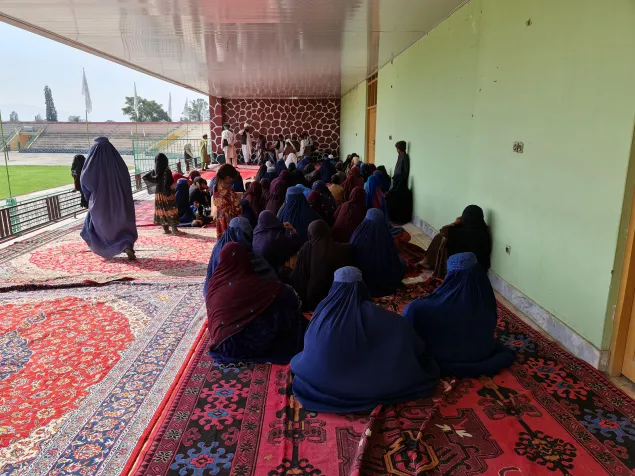
Women from Woch Khwara waiting in a stadium in Afghanistan's eastern Khost Province to receive ICRC’s cash grant.
Hazrat Khan, who has a family of 37 people, lost his house in the flash floods that hit the country in August. Desperate to provide for his family, he has been doing small jobs that earn him only around 70 AFN ($0.8) a day and are not sufficient to make ends meet. "The cash assistance brought us back to life. It was like throwing a fish back into the sea," he said.
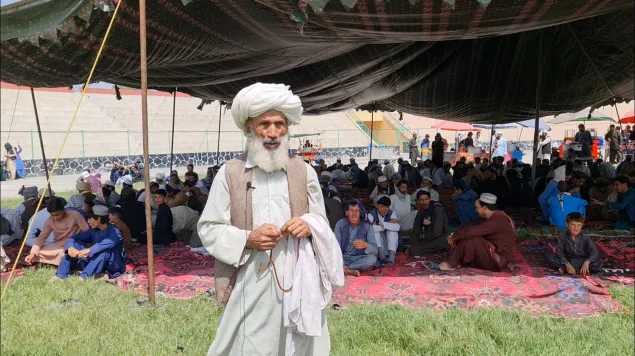
Hazrat Khan, a returnee from Pakistan, currently living in Woch Khwara.
Baank, one of the disabled people in Woch Khwara who benefited from the ICRC's cash assistance programme, said he used it to buy food. "It is hard for people like me to cope with the situation. I call on the international community to help people who have no work and no food," he said.
Baank's situation also reflects the greater dilemma facing the country. Since August 2021, nearly 700,000 people have lost their jobs and nearly 90 per cent of the employed population earns less than $1.9 a day. According to latest estimates more than 24 million people need humanitarian assistance across the country.
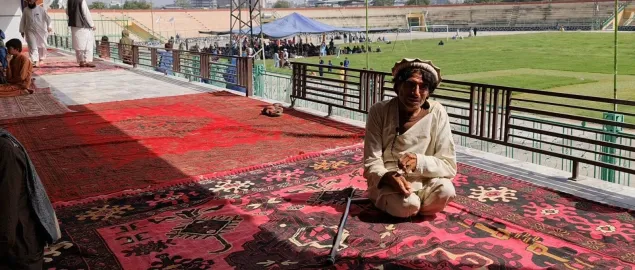
Baank, who is physically disabled and homeless, discusses his livelihood issues during the second round of ICRC’s cash distribution.
This year, the ICRC gave multipurpose cash grants to over 10,000 most vulnerable families (80,000 individuals) across Afghanistan to meet their essential needs. We also gave cash grants to 20,000 small-scale farmers (impacting 160,000 individuals) for land preparation and to buy agricultural supplies. However, much more is needed in the form of humanitarian assistance as people deal with the impact of years of conflict, increase in prices of fuel and fertilizers and lack of opportunities to earn sustainable livelihoods.
The ICRC has served the people of Afghanistan for more than 40 years and will continue to do so as long as our support is needed. We are working across the country, together with the Afghan Red Crescent Society. We currently have a team of over 1,800 staff who provide a range of humanitarian services, including quality health care, physical rehabilitation support, protection, improved water and sanitation and economic security. Our teams are present in Khost, Herat, Lashkar Gah, Kandahar, Kabul, Mazar-i-Sharif, Faizabad, Jalalabad, Ghazni, Gulbahar and Farah.

